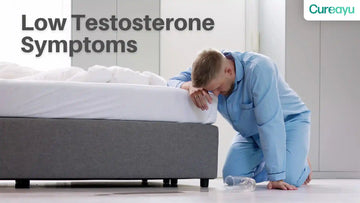Testosterone and its role in health and wellness has received more attention in recent years. However, for the role that has already been documented, most people still have difficulty recognising the subtle but powerful symptoms of low testosterone levels. Many times these symptoms are misunderstood, muddled over or neglected — leaving people to suffer in silence as they endure an existence that is far from a life worth living.It's crucial to shed light on this topic, dispel myths, and present a clear understanding of both the symptoms and solutions for low testosterone levels.
Low testosterone, often referred to as "Low T," can manifest in a variety of ways and can affect every facet of a person's life. While testosterone is typically associated with male health, it is important to note that women also rely on this hormone for several vital functions. This blog aims to demystify the complex maze of low testosterone symptoms, uncover their causes, and offer a helping hand to those in need of guidance and solutions. We'll explore what testosterone does in the body, examine the multifaceted symptoms of low testosterone, discuss potential causes, and finally, lay out possible treatments for those affected.
Also Read: Optimizing Health with Testosterone: Natural Boosters and Ayurvedic Insights
What Does Testosterone Do?
Regulating Libido
Testosterone is paramount in regulating sexual desire, commonly known as libido. It drives sexual arousal and interest by directly influencing parts of the brain related to sexual behavior. A drop in testosterone can lead to a noticeable decrease in sexual interest, impacting intimate relationships.
Supporting Bone Density
Vital to maintaining healthy bone density, testosterone aids in bone formation and resorption. A dip in testosterone levels can lead to weakened bones, increasing the risk of fractures and osteoporosis, especially in later years.
Promoting Muscle Growth
Testosterone plays a significant role in muscle protein synthesis, stimulating muscle growth and strength. Low levels of testosterone may lead to muscle wastage and a decrease in physical strength, often noticeable in physical performance and stamina.
Enhancing Mood and Mental Health
Testosterone has a profound impact on mood and cognitive function. Sufficient levels of testosterone can help to regulate emotions and ward off depression and anxiety, making it essential for maintaining a stable mood.
Influencing Fat Distribution
The hormone also affects how and where fat is distributed in the body. Low testosterone can lead to increased body fat, particularly belly fat, which is not just a concern aesthetically but also medically.
What Is Low Testosterone?
Low testosterone, clinically known as hypogonadism, occurs when the body fails to produce adequate levels of testosterone. This can happen at any age, though it is more common as one ages. For men, significantly low testosterone levels can affect the body's ability to produce sperm, leading to fertility issues. In women, low testosterone levels can contribute to a decrease in bone density and reduced libido, alongside other symptoms. Diagnosis typically involves blood tests measuring the amount of testosterone in the bloodstream, usually conducted in the morning when testosterone levels are at their peak.
Also Read: 10 Proven Ways to Boost Testosterone Levels Naturally
Low Testosterone Symptoms
Decreased Libido
One of the most common symptoms of low testosterone is a diminished interest in sexual activity. This symptom can cause stress in relationships and affect intimate satisfaction.
Fatigue and Decreased Energy Levels
If daily fatigue and low energy are constant companions, they may be signaling a testosterone issue. People with low testosterone often find themselves easily fatigued, even after adequate rest or minimal exertion.
Loss of Muscle Mass
Noticing a surprising decrease in muscle mass or strength? Reduced testosterone levels can lead to muscular deficiencies, impacting overall physical performance.
Increased Body Fat
Low testosterone can contribute to increased fat accumulation, particularly around the midsection. This visceral fat not only alters physical appearance but also heightens the risk for other health issues.
Mood Changes
Men and women with low testosterone often experience mood swings, memory issues, or feelings of depression. These symptoms may be wrongly attributed to natural aging or stress, masking the need for medical attention.
Low Testosterone Causes
Aging
A decline in testosterone production is a common consequence of aging. Most men will see a gradual decrease in testosterone levels after the age of 30.
Medical Conditions
Diseases such as diabetes, obesity, and certain endocrine disorders can negatively impact testosterone levels. Proper management of these conditions is crucial for maintaining hormone balance.
Injury or Trauma
Trauma or injury to the testicles, where testosterone is primarily produced, can diminish the hormone's levels. Surgical procedures involving the testicles or prostate can also lead to reduced testosterone production.
Genetic Conditions
Genetic disorders, such as Klinefelter syndrome or hemochromatosis, can affect normal testosterone production and lead to symptoms of low testosterone.
Also Read: Understanding Prostate Problems: Symptoms, Causes, and Solutions
When To See a Doctor
Persistent Fatigue: If constant fatigue or lack of energy interferes with daily life, it may warrant a professional evaluation.
Changes in Libido: While libido naturally fluctuates, a noticeable and lasting decrease should be medically assessed.
Unexplained Physical Changes: Sudden weight gain, loss of muscle mass, or changes in facial and pubic hair are signals that should prompt a medical check.
Mood Alterations: If experiencing prolonged periods of depression, irritability, or mood swings, it's essential to discuss these issues with a healthcare provider.
Fertility Concerns: Difficulty in conceiving or changes in sexual function can indicate testosterone imbalance and require medical advice.
Low Testosterone Treatment
Testosterone Replacement Therapy (TRT)
This involves supplementing testosterone through injections, patches, gels, or pellets. TRT can effectively improve symptoms of low testosterone but should be carefully monitored by a healthcare professional due to potential side effects.
Lifestyle Modifications
Incorporating a healthy diet, regular exercise, and adequate sleep can naturally support testosterone levels. Reducing stress through mindfulness or relaxation techniques may also be beneficial.
Medication
Certain medications and supplements can stimulate the body's natural hormone production. These should only be taken under the guidance of a healthcare provider.
Addressing Underlying Conditions
Treating primary health issues like obesity or diabetes can naturally boost testosterone levels as these conditions are often interlinked with hormone production efficiency.
Also Read: Boosting Your Immune System and Heart Health: A Holistic Approach
Conclusion
Understanding the role of testosterone and recognizing its symptoms are essential steps toward safeguarding one's health and quality of life. Low testosterone is not just an issue of aging but can be a significant health concern impacting various aspects of physical, emotional, and mental health. By educating ourselves and acknowledging the signs, we empower ourselves to seek appropriate medical advice and interventions.
If you're experiencing any symptoms associated with low testosterone, it’s crucial not to delay discussing them with a healthcare provider. From lifestyle modifications to medical treatments, various strategies can effectively address low testosterone, enabling individuals to lead healthier, more fulfilling lives. Remember, being proactive about your health is the best approach; it enables you to tackle issues head-on and enjoy life's meaningful moments with vitality and enthusiasm. Act now, and reclaim a life brimming with energy, confidence, and well-being.








